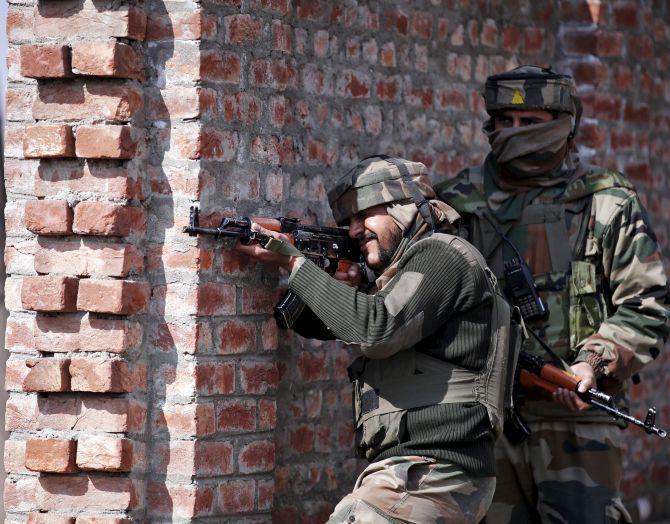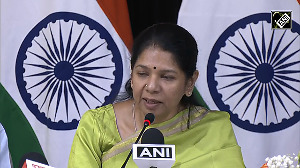'It is possible elements within the Pakistani establishment felt bad about eating humble pie and wanted to avenge the humiliation through a terror attack.'
'After all, lodging an FIR in Pakistan about the Pathankot attack amounted to an admission of Pakistani involvement,' says Rajeev Sharma.

The Pampore encounter between heavily armed terrorists and security forces in an educational institute building on the outskirts of Srinagar since Saturday afternoon is yet another event that shapes the episodic nature of India-Pakistan relations.
This incident was much lower on the impact scale of Indo-Pak ties than the January 2 terror attack on the Pathankot airbase, but we can make this determination only with the advantage of hindsight because the security forces averted a huge hostage crisis in the nick of time in Pampore.
About one hundred students, teachers and others were trapped in the Entrepreneurs Development Institute at Pampore on the Srinagar-Jammu national highway where the terrorists had taken refuge after attacking a security convoy.
Unfortunately, not much has been written about how the trapped civilians were evacuated from the building before the terrorists could hold them hostage and significantly increase their bargaining power.
Had this happened, Pampore would have become a national crisis and a second major flashpoint in India-Pakistan relations after Pathankot in just about fifty days after the terror attack on the Indian Air Force base.
This may have happened because the terrorists were perhaps not aware of the potential of the Pampore building they were sneaking into after taking on the security forces. Perhaps the terrorists had not done enough reconnoissance of the buildings in the targeted area.
But this does not mean that the terrorists will repeat their mistake in future operations. On the contrary, the terrorists' masters will conduct a thorough recce before subsequent operations.
This is the most chilling message from the Pampore incident.
After all, the Indian security forces have to be lucky every time while the terrorists have to be lucky just once and they can embarrass the Indian State for a long time.
Perhaps the Pampore terrorists were in a hurry and weren't given ample time by their masters to prepare. But why this great hurry?
Answers to these questions will surface after many days, if at all they do. But this takes us to the big picture in the India-Pakistan context.
The episodic nature of India-Pakistan relations is characterised by a repetitive trend of terror strikes in India or against Indian interests abroad (particularly Afghanistan) whenever the two nuclear armed neighbours are about to start a bilateral engagement or even talk about the talks.
One such major development had just happened. The Pakistani authorities had lodged an FIR against unknown persons in the Pathankot terror attack case at the Counter Terrorism Department in Gujranwala in Punjab province a day before the Pampore attack.
It is quite possible that certain elements within the Pakistani establishment felt bad about eating humble pie and wanted to avenge this humiliation through yet another terror attack.
After all, lodging an FIR in Pakistan about the Pathankot attack amounted to an admission of Pakistani involvement.
This may explain why the Pampore terror operation was a rather rushed job. The Indian security establishment is well aware of the fact that Pakistani State actors keep their non State actors on a tight leash and learn fast lessons from their operations.
The moral of the story is clear. The India-Pakistan bilateral equation is this: Talks=new terror attacks.
More rapprochement events are round the corner, the most immediate being a Pakistani Special Investigation Team visiting Pathankot to conduct a joint probe into the terror attack at the airbase.
The corollary to this need not be specified in black and white terms. Both sides are aware of what is happening and what to expect next.
It is a game of chess. India has to be on its guard.
Rajeev Sharma is a New Delhi based independent journalist and strategic analyst who tweets @Kishkindha










